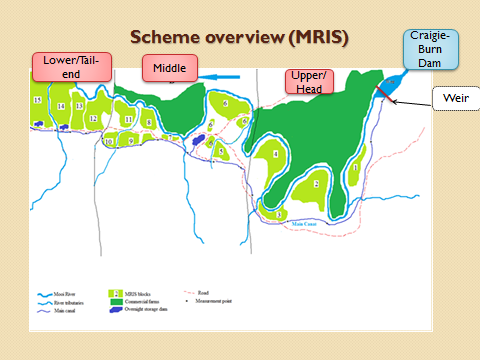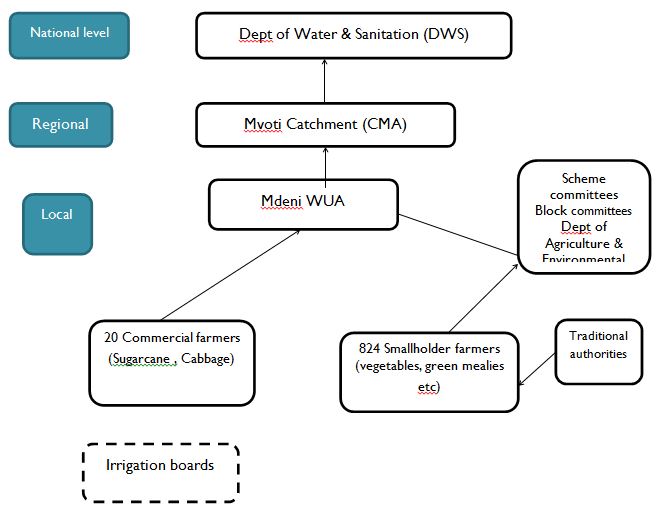 The challenge of allocation and management of irrigation water at a community level is always a thorny issue, affecting access and utilisation of the resource. This has been investigated among smallholder irrigation farmers in the Mooi River Irrigation Scheme (MRIS), located in South Africa’s KwaZulu-Natal Province. The scheme spans a stretch of over 20km, 604ha in size, with over 800 participants farming individually on plots within and outside the scheme. Water is diverted from the river at a weir built across the river into a canal that stretches over 20km, supplying water to the fields. Canal water, which was initially meant for irrigation purposes, is also used by the community for watering livestock, domestic use and construction activities. The main issue is the non-excludability nature of canal water in the area, which is owned by the community. Based on South Africa’s National Water Act of 1998, many rural communities use water under general authorisation, which means that they do not pay for the water. This fact turns a supposedly common resource into an open access resource, where no one within the community has the right to exclude anyone else from accessing the resource.
The challenge of allocation and management of irrigation water at a community level is always a thorny issue, affecting access and utilisation of the resource. This has been investigated among smallholder irrigation farmers in the Mooi River Irrigation Scheme (MRIS), located in South Africa’s KwaZulu-Natal Province. The scheme spans a stretch of over 20km, 604ha in size, with over 800 participants farming individually on plots within and outside the scheme. Water is diverted from the river at a weir built across the river into a canal that stretches over 20km, supplying water to the fields. Canal water, which was initially meant for irrigation purposes, is also used by the community for watering livestock, domestic use and construction activities. The main issue is the non-excludability nature of canal water in the area, which is owned by the community. Based on South Africa’s National Water Act of 1998, many rural communities use water under general authorisation, which means that they do not pay for the water. This fact turns a supposedly common resource into an open access resource, where no one within the community has the right to exclude anyone else from accessing the resource.
Multiple uses of canal water in the MRIS has, at times, jeopardised water access by the irrigators in the scheme. Some water uses, such as laundry along the canal, has also affected water quality, which could affect crop harvest in the medium to long term. This raises critical questions as to what extent water quality management at the local level should be enforced, especially in South Africa, which is grappling with both a water shortage and poor farm output at smallholder level. Is it poor water quality that leads to poor output or physical scarcity of water for sustainable food production? It can be argued that both aspects are negatively affecting food production.
 Water quality is mainly a human driven factor, except in a few cases of acid rain or other unusual climatic processes. The severity of water shortages can be averted by improving the management and governance systems. However, the other question that arises is: do our water governance and management systems adequately respond to the multiple needs of the local communities? In most cases they don’t. Parallel or rather fragmented governance systems often exist, where water allocation is managed by one department, and quality issues are monitored by another. Desirable outcomes can only be achieved through a much more coordinated effort to ensure that each entity delivers its mandate. The South African government strongly emphasizes the need for strong horizontal and vertical co-operative governance between the various agencies. Better collaboration between the Department of Water and Sanitation, Catchment Management Agencies (CMA), Water User Associations (WUA), traditional authorities, and the National and Provincial Departments of Agriculture may lead to, for example, more productive water use by agricultural smallholders.
Water quality is mainly a human driven factor, except in a few cases of acid rain or other unusual climatic processes. The severity of water shortages can be averted by improving the management and governance systems. However, the other question that arises is: do our water governance and management systems adequately respond to the multiple needs of the local communities? In most cases they don’t. Parallel or rather fragmented governance systems often exist, where water allocation is managed by one department, and quality issues are monitored by another. Desirable outcomes can only be achieved through a much more coordinated effort to ensure that each entity delivers its mandate. The South African government strongly emphasizes the need for strong horizontal and vertical co-operative governance between the various agencies. Better collaboration between the Department of Water and Sanitation, Catchment Management Agencies (CMA), Water User Associations (WUA), traditional authorities, and the National and Provincial Departments of Agriculture may lead to, for example, more productive water use by agricultural smallholders.
It can also be argued that although a polycentric water governance system exists in the Mooi River Irrigation System, as it does in many state-funded schemes across South Africa, it is not always as efficient and effectiveas it could be. The governance system comprises of local irrigation committees, traditional leaders, the Department of Agriculture, Rural Development, Land and Environmental Affairs (DARDLEA), CMAs, WUAs and cooperatives. The multiple organisations present a complex set of both formal and informal governance scenarios, and clarity of organisational roles and relevance is critical. An integrated approach, anchored on the principle of polycentric governance with strong people participation is essential in rural communities where the same water source is used simultaneously for drinking, domestic and a range of productive purposes. Sanitation and waste management often directly affect other water sources as well. Water development for one group of villagers easily affects other users and may jeopardize the fulfilment of peoples’ basic needs.

An effort was made to understand what smallholder irrigation water users regard as the best mechanisms to enhance water management practices in the scheme. Through a series of focus group discussions, water users ranked the preferred intervention mechanisms to tackle the water management challenges.
Irrigators suggested the focus could be put on improvement of operational rules and by-laws to reduce unauthorised uses of canal water, but these may fail to yield positive results if the enforcement agencies are weak and not supported by the users. Water users emphasised the need to prioritise training on water management at the community level, and to empower local irrigation committees to enforce rules and give penalties to offenders without fear of victimisation. This comes against the backdrop of minimal farmer training on irrigation water management, including scheduling by water users in the MRIS.
An understanding of water managementis anticipated to have a positive effect on water access in the MRIS, but this has to be complemented by effective irrigation committees that can enforce operational rules for the benefit of the entire scheme. These committees can be more effective if the majority of the users are aware of best practices in irrigation management. A combination of irrigator training on these best practices, and effective irrigation committees, can ensure effective cooperation in water management and collective action activities. Similarly, many irrigators are dissatisfied with the involvement of political leadership in the management of irrigation water.
It could also be argued that a broader focus, such as the adoption of strategies to enhance psychological capital among irrigators, might improve irrigation performance. Self-efficacy, hope and resilience – three of the four components of psychological capital – is what is currently missing among farmers in the MRIS. This becomes clearer as water shortages and levels of water pollution increase, farmers quit, and infrastructure deteriorates as farmers fail to participate in collective activities such as the maintenance of water infrastructure.
Technical interventions can be pursued at scheme level, including the provision of lockable water supply infrastructure to ensure easy control of unsanctioned withdrawal of water, the upgrading of supply capacity and water measurement devices. However, there should also be a focus on improving the institutional arrangements, management capacity and the governance systems which can achieve better water allocation and minimize supply uncertainties. Without investing in building effective local institutions, promoting user cooperation and building positive psychological capital among users, engineering interventions for CPR management are often subject to vandalism and infrastructure decay.
Binganidzo Muchara is a post-doc research fellow with the International Water Security Network (IWSN), Monash South Africa. The author acknowledges funding from the Water Research Commission (WRC), under project number K5/1879/4). The views expressed in the article are those of the author and not IWSN or WRC.
